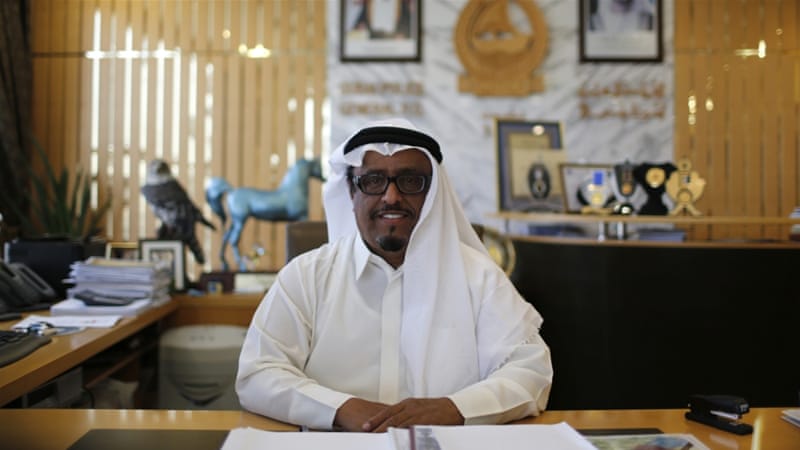Dubai security chief calls for bombing of Al Jazeera

A senior security official in the United Arab Emirates (UAE) has sparked outrage after calling for the bombing of Al Jazeera, the Qatar-based media network.
In a series of posts on Twitter on Friday, Dubai Lieutenant General Dhahi Khalfan launched a scathing attack against Al Jazeera, accusing it of provoking a bomb and gun assault on a mosque in Egypt’s Sinai Peninsula earlier in the day.
“The alliance must bomb the machine of terrorism … the channel of ISIL, al-Qaeda and the al-Nusra front, Al Jazeera the terrorists,” the former police chief and now head of security in the Emirate told his 2.42 million followers on the social media site.
“For how long will they [Al Jazeera] continue to tamper with the security of Egypt and the Arab world?” he tweeted.
Khalfan then posted an image of Al Jazeera’s iconic logo superimposed in front of Abu Bakr al-Baghdadi, head of the Islamic State of Iraq and the Levant (ISIL, also known as ISIS) group, former al-Qaeda leader Osama bin Laden, Hezbollah leader Hassan Nasrallah, and 91-year-old Islamic theologian Yusuf al-Qaradawi.
What Dhahi Khalfan is doing is incitement to terrorism. Terrorism is not just limited to committing a crime, but any act or statement that paves the way for a terrorist act or incites it, and incitement to terrorism is terrorism itself.
Yaser Abuhilalah, managing director of Al Jazeera Arabic
Yaser Abuhilalah, managing director of Al Jazeera Arabic, said Khalfan bore “full responsibility for any attack against Al Jazeera and its employees”.
“The UAE needs to respond [to Khalfan’s comments]. He’s not just an Emirati citizen but an official in the UAE government,” Abuhilalah told al-Quds al-Arabi on Saturday.
“He is using a moment of anger and grief over the terrible attack in Sinai to fuel his hatred against Al Jazeera.
“What Dhahi Khalfan is doing is incitement to terrorism. Terrorism is not just limited to committing a crime, but any act or statement that paves the way for a terrorist act or incites it, and incitement to terrorism is terrorism itself,” he said.
Stoking controversy
Khalfan has made several controversial comments in the past but has never been prosecuted under the UAE’s anti-hate speech laws.
In March of last year, he made headlines after urging Arabs to ally with Israel against “enemies of the Middle East” – a veiled attack against Iran and the region’s Shia Muslims.
And earlier this year, the 66-year-old tweeted his “complete support” for US President Donald Trump’s Muslim ban.
Khalfan railed against Iraqis, Somalis and Iranians, nationalities included in the US travel restrictions, calling them “unproductive groups”, mocked the war and poverty afflicting Iraq, and would also call on the UAE to annex Qatar, referring to it as an “eighth emirate.”
The UAE, Saudi Arabia, Egypt and Bahrain cut ties with Qatar on June 5, accusing it of supporting “terrorism”, an allegation Doha has vehemently denied.
As part of the blockade, the UAE made expressing sympathy towards Qatar a punishable offence, with a jail term of up to 15 years and a fine of at least AED 500,000 ($136,000).
On June 22, the Saudi-led group issued a 13-point list of demands, including the shutdown of Al Jazeera, the limiting of ties with Iran and the expulsion of Turkish troops stationed in the country, as a prerequisite to lifting the sanctions.
Qatar rejected the demands as an infringement on its sovereignty.
Since its launch 21 years ago, Al Jazeera’s offices have occasionally been bombed or shut down in many places, including Kabul, Baghdad and Gaza.
























